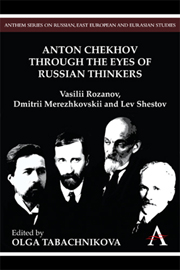 Anton Chekhov Through the Eyes of Russian Thinkers
Anton Chekhov Through the Eyes of Russian Thinkers Book contents
- Frontmatter
- Contents
- Acknowledgments
- Introduction
- List of Names
- List of Russian Cultural Concepts
- Three Brief Biographies – Rozanov, Merezhkovskii and Shestov
- Part One Vasilii Rozanov
- 1 Rozanov on Chekhov: ‘Overcoming Literature’ and Extending Horizons
- 2 Kind and Quiet: Vasilii Rozanov's Reading of Chekhov
- 3 Contemporaneity, Competition and Combat. Facts and Fictions about Everybody and Passiveness, Orientalism and Anaesthesia in Rozanov's View on Chekhov
- 4 ‘Tree of Life’ and ‘Dead Waters’: Why was Rozanov Afraid of Chekhov?
- Part Two Dmitrii Merezhkovskii
- Part Three Lev Shestov
- Notes on Contributors
1 - Rozanov on Chekhov: ‘Overcoming Literature’ and Extending Horizons
from Part One - Vasilii Rozanov
Published online by Cambridge University Press: 05 March 2012
- Frontmatter
- Contents
- Acknowledgments
- Introduction
- List of Names
- List of Russian Cultural Concepts
- Three Brief Biographies – Rozanov, Merezhkovskii and Shestov
- Part One Vasilii Rozanov
- 1 Rozanov on Chekhov: ‘Overcoming Literature’ and Extending Horizons
- 2 Kind and Quiet: Vasilii Rozanov's Reading of Chekhov
- 3 Contemporaneity, Competition and Combat. Facts and Fictions about Everybody and Passiveness, Orientalism and Anaesthesia in Rozanov's View on Chekhov
- 4 ‘Tree of Life’ and ‘Dead Waters’: Why was Rozanov Afraid of Chekhov?
- Part Two Dmitrii Merezhkovskii
- Part Three Lev Shestov
- Notes on Contributors
Summary
Among the notes found in Chekhov's archive, the following passage can be found:
While we in our intelligentsia circles pick over old material and, according to the old Russian custom, denounce each other, life, which we do not know and do not notice, boils all over us. Great events will catch us unprepared like sleeping beauties. You will see that the merchant Sidorov and a school teacher from the provincial town of Elets, who see and know more than we do, will push us right to the back because they will have accomplished more than all of us put together.
This note dates back to the late 1880s or early 1890s, when Chekhov worked on ‘Rasskaz neizvestnogo cheloveka’ (‘An Anonymous Story’, 1893), and the mention of a teacher from Elets does not appear here by accident. It is not just the belief in Russia as full of provincial towns. Chekhov might have had in mind the example of the philosophical work On Understanding (O ponimanii) which appeared shortly before this note (1886), the first publication by Vasilii Rozanov, who became a teacher in Elets in 1887.
This is the first similarity between these two contemporaries: a profound and simultaneous interest in the problem of understanding. In Rozanov's work, understanding is a measure of the usefulness of a branch of science or philosophy.
- Type
- Chapter
- Information
- Anton Chekhov Through the Eyes of Russian ThinkersVasilii Rozanov, Dmitrii Merezhkovskii and Lev Shestov, pp. 3 - 12Publisher: Anthem PressPrint publication year: 2010
